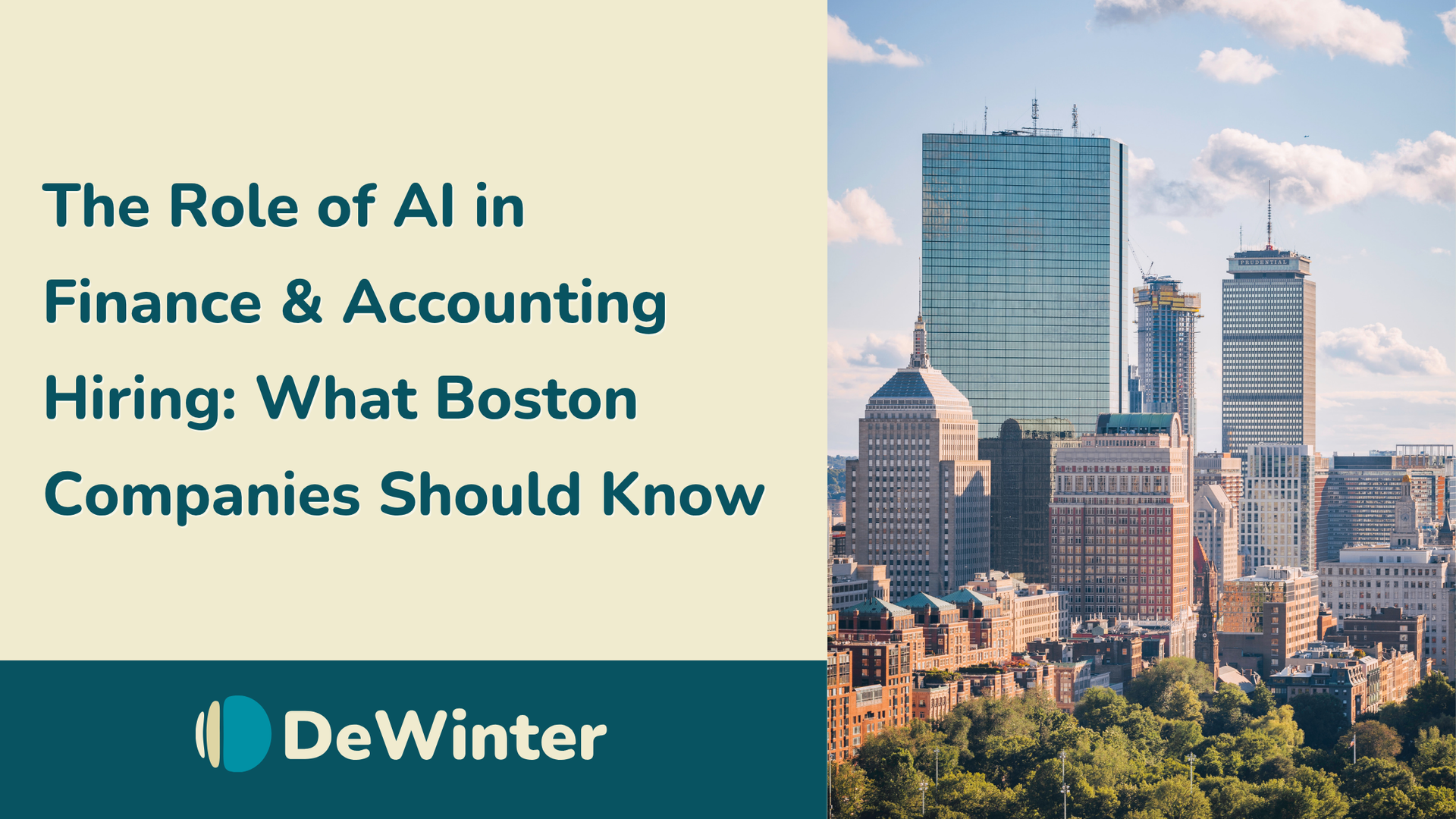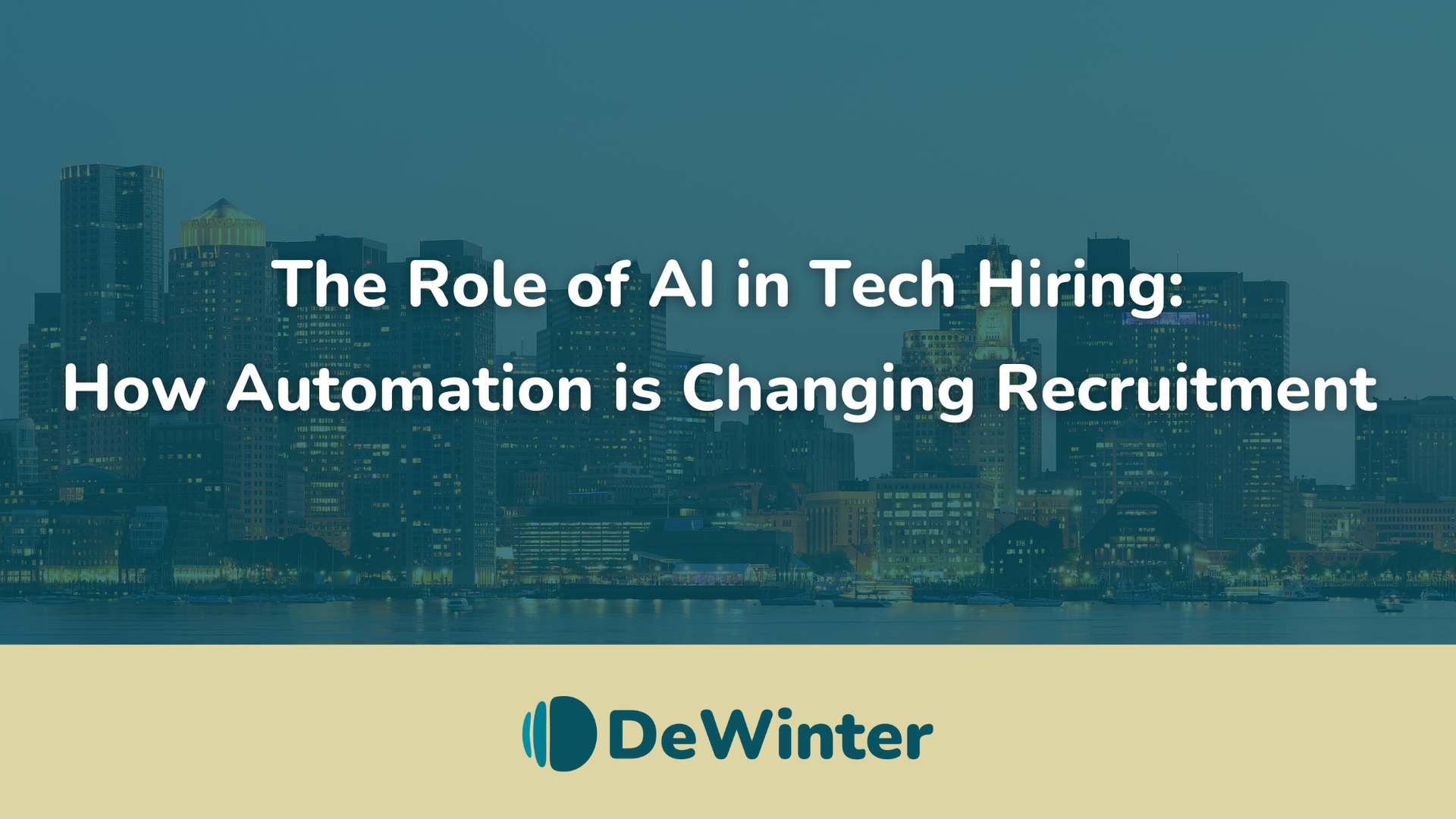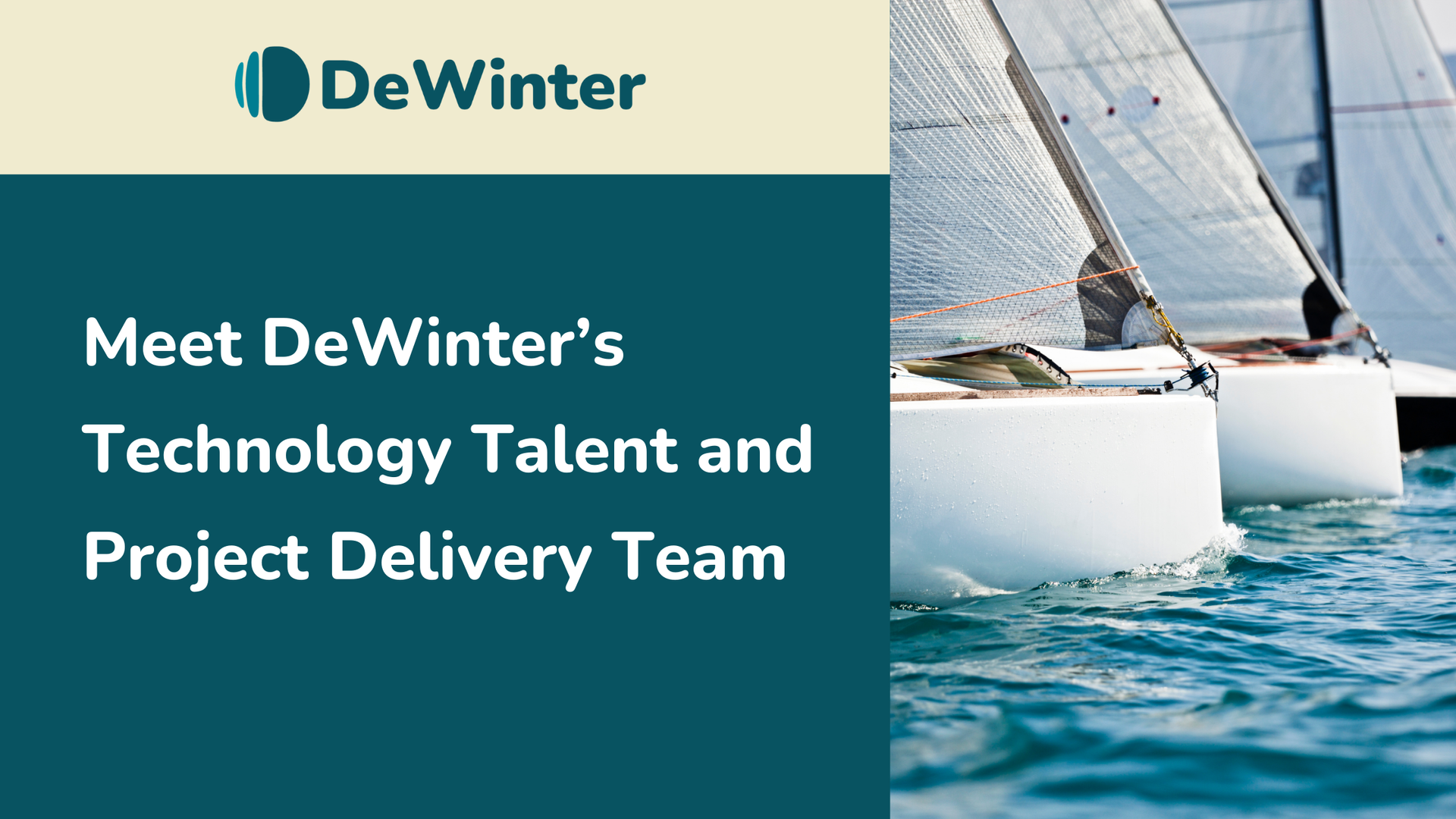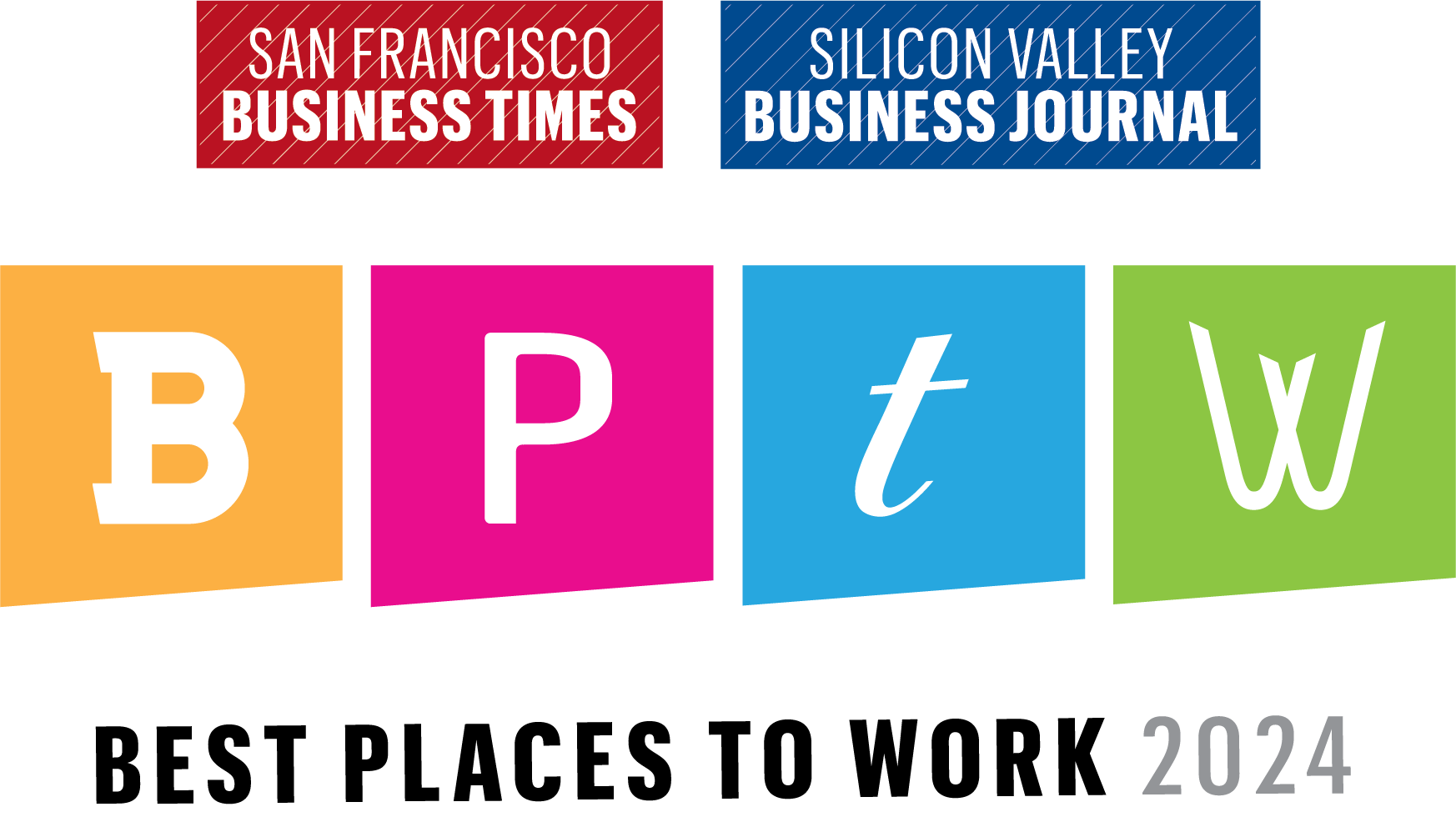The Role of AI in Finance & Accounting Hiring: What Boston Companies Should Know

The vibrant finance and accounting landscape in Boston is no stranger to innovation. From established financial institutions to rapidly growing tech startups, the demand for top-tier talent remains consistently high. However, a shift is underway, one that promises to fundamentally reshape how finance and accounting professionals are recruited, trained, and utilized: the rise of Artificial Intelligence (AI).
For Boston-area employers and hiring managers, embracing the AI-driven revolution in hiring is no longer optional—it’s essential to staying competitive. With our finger on the pulse of both candidate expectations and market demands, we understand the stakes firsthand. Located in the heart of Boston, our DeWinter team has built a reputation as a trusted partner in finance, accounting, and technology staffing across Massachusetts and the greater New England region. In this article, we’ll explore how AI is reshaping hiring in finance and accounting, highlighting key automation trends, in-demand skills, and actionable strategies to help your team lead in this evolving landscape.
Automation: Redefining Roles and Routines
AI and Robotic Process Automation (RPA) are rapidly automating many of the repetitive, rule-based tasks that have historically formed the backbone of finance and accounting roles. Think invoice processing, data entry, reconciliations, and even some aspects of financial reporting. These aren't just efficiency gains; they are fundamental shifts that free up team members for higher-value activities.
In Boston, firms are already leveraging AI to:
- Streamline internal processes: Automated systems can handle the heavy lifting of data aggregation and initial analysis, leading to faster month-end closes and real-time financial insights. This translates to finance departments operating at faster speeds, enabling quicker decision-making. In fact, some studies find that reporting errors are reduced by 90% when automation is implemented across financial operations.
- Enhance accuracy and compliance: AI-powered tools virtually eliminate human error in data handling, ensuring greater accuracy in financial records and significantly improving audit readiness. These automated workflows even create comprehensive audit trails, meeting stringent accounting standards.
- Reduce operational costs: While there's an upfront investment, the long-term cost savings from reduced labor and fewer errors are substantial. Scalable AI platforms can accommodate significant business growth without a proportional increase in headcount, a major benefit for scaling Boston businesses. Indeed, AI has shown significant potential, with some reports indicating cost reductions of up to 20% in procurement and operational tasks by automating processes and reducing labor expenses.
This automation trend means that the traditional duties of entry-level and even some mid-level finance and accounting professionals are evolving. The emphasis is shifting from transactional processing to analytical interpretation and strategic contribution. As Ginni Rometty, former CEO of IBM, famously put it, "AI will not replace humans, but those who use AI will replace those who don't."
In-Demand Skills for the AI-Powered Finance Professional
As AI takes over the mundane, the skills that will define success for finance and accounting professionals in Boston are shifting dramatically. Employers should look for candidates who aren't just good with numbers, but also comfortable with new tech.
Here are some of the most in-demand skills:
- Data Literacy and Analytics: Beyond basic Excel, professionals need to be adept at understanding, interpreting, and even manipulating large datasets. Skills in data mining, advanced analytics, and familiarity with business intelligence (BI) tools are becoming crucial. This includes understanding statistical analysis techniques to extract meaningful insights from data.
- AI Literacy and Understanding: It’s not about being an AI developer, but about understanding how AI tools work, their capabilities, and their limitations. This includes knowing how to leverage AI for tasks like forecasting, risk modeling, and generating financial reports. For example, understanding how to interact with Generative AI models to summarize information or analyze complex financial data is invaluable.
- Critical Thinking and Problem-Solving: With automation handling routine tasks, finance professionals will spend more time analyzing exceptions, identifying discrepancies, and solving complex financial problems. The ability to think strategically and critically about financial data is extremely important when given these more complex and technical problems.
- Communication and Storytelling: Translating complex financial insights, often generated by AI, into understandable and actionable recommendations for non-finance stakeholders is a vital skill. Strong communication, presentation, and collaboration abilities are essential for finance professionals to contribute meaningfully to strategic planning.
- Adaptability and Continuous Learning: The pace of technological change means that finance and accounting professionals must embrace a mindset of continuous learning. Staying updated on new AI tools, regulatory changes, and evolving best practices is non-negotiable for career longevity. The World Economic Forum's Future of Jobs Report indicates that "analytical thinking and innovation are among the top skills projected to grow in prominence by 2027," reflecting the increasing value placed on data-driven decision-making in accounting.
- Cybersecurity Awareness: As more sensitive financial data is processed and stored by AI systems, a strong understanding of data governance, security, and privacy best practices is crucial to mitigate vulnerabilities.
- Risk Management: In a rapidly evolving financial landscape driven by AI, the ability to identify, assess, monitor, and mitigate risks, including those introduced by new technologies, is highly sought after.
For Boston employers, finance and accounting staffing and recruiting efforts should actively seek out candidates who demonstrate these future-proof skills. Investing in upskilling current employees in these areas will also be critical for retaining top talent and maintaining a competitive edge.
Reshaping Recruitment: AI in Finance and Accounting Staffing
The impact of AI isn't limited to the finance department itself; it's also revolutionizing the finance and accounting recruiting process. Staffing agencies and internal HR teams in Boston are increasingly using AI to enhance effectiveness.
- Forecasting Talent Needs: AI can analyze market trends, economic indicators, and internal business growth projections to help firms anticipate future hiring needs, allowing for proactive talent acquisition strategies rather than reactive ones.
- Chatbots for Candidate Engagement: AI-powered chatbots can answer common candidate questions, schedule interviews, and provide updates, offering a seamless and efficient experience for job seekers.
- Bias Reduction (with caution): While AI can introduce new biases if not carefully managed, when properly implemented, it can help reduce human bias in the initial screening process by focusing purely on skills and qualifications. However, continuous monitoring and ethical considerations are crucial.
For Boston-based finance and accounting staffing and recruiting firms, adopting these AI tools is crucial for staying ahead in a competitive market. It allows them to deliver more qualified candidates faster, ultimately providing greater value to their clients. The "global financial automation market is projected to grow at a compound annual growth rate (CAGR) of over
14.2% from 2024 to 2032," highlighting the rapid adoption of these technologies.
How Boston Firms Can Adapt to AI and Stay Ahead
To thrive in this evolving landscape, Boston employers and hiring managers need a proactive strategy
- Redefine Job Descriptions: Re-evaluate existing finance and accounting roles. Update job descriptions to reflect the new emphasis on analytical, technological, and strategic skills. Clearly communicate the shift from transactional processing to value-added analysis.
- Invest in Upskilling and Reskilling Programs: Look beyond external hiring. Identify current employees with potential and invest in training programs that build AI literacy, data analytics skills, and critical thinking. Partner with local educational institutions or offer internal workshops.
- Embrace Hybrid Roles: The integration of AI means many roles will become hybrid, combining traditional finance responsibilities with technology-driven tasks. Foster an environment where professionals are comfortable with both aspects.
- Partner with Forward-Thinking Staffing Agencies: Collaborate with finance and accounting staffing agencies in Boston, like DeWinter, that are already embracing AI in their recruitment processes. These partners will have a deeper understanding of the evolving skill sets and access to a future-ready talent pool.
- Foster a Culture of Continuous Learning: Encourage curiosity and a growth mindset within your finance and accounting teams. Provide opportunities for experimentation with new technologies and celebrate learning from both successes and failures.
- Focus on Soft Skills: While technical skills are vital, never underestimate the importance of soft skills like communication, collaboration, and adaptability. These are inherently human qualities that AI cannot replicate and will become even more valuable. The U.S. Bureau of Labor Statistics highlights "analytical and critical-thinking skills," "communication skills," and "organizational skills" as important qualities for accountants and auditors, emphasizing their continued relevance alongside technological proficiency.
- Ethical AI Implementation: As you integrate AI into your hiring and financial operations, prioritize ethical considerations. Ensure fairness, transparency, and accountability in your AI systems, especially when handling sensitive data.
The future of finance and accounting staffing in Boston is deeply linked to the integration of AI technology. For employers and hiring managers, this evolution isn’t something to fear—it’s a powerful chance to build smarter, more strategic finance teams. By staying ahead of these changes, Boston firms can attract top-tier talent equipped to handle the complexities of today’s financial landscape and keep their competitive advantage on a global scale.
That’s where DeWinter comes in, a trusted local partner with deep expertise in finance, accounting, and technology recruiting. DeWinter is uniquely positioned to help your organization connect with the AI-ready professionals who will drive your success in this new era.
Search Finance and Accounting Jobs
Find the Best Career Opportunities in the Bay Area, Southern California, Boston, and Beyond.













